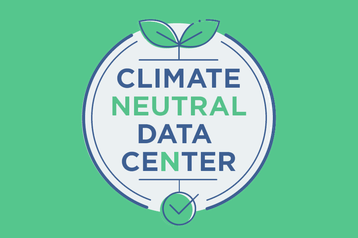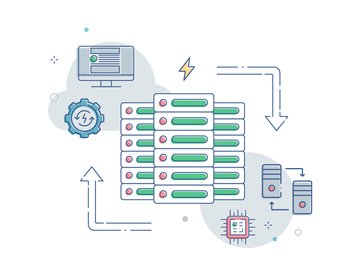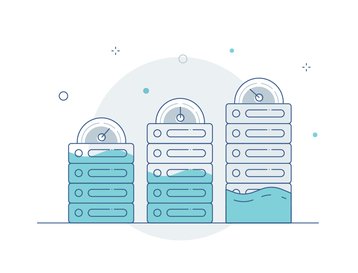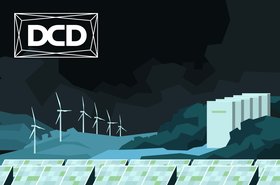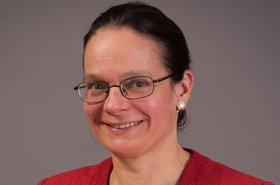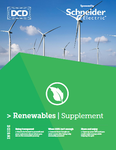Major European cloud and data center operators, including AWS, Google, and Equinix, as well as smaller and national providers, have signed up to an agreement to become climate neutral by 2030.
The Climate Neutral Data Centre Pact is backed by 17 industry bodies, and sets targets for efficiency and the use of green energy, as well as making data centers into a circular economy. It follows the Europan Union's announcement of a Green Deal at the end of 2019, and commits the industry to reach carbon neutrality by 2030. Within the pact, the providers have all promised to increase and measure their efficiency, to use 100 percent renewable energy, to address water efficiency and take part in a circular economy to repair and recycle servers, as well as reusing waste heat where possible. Among other details, the group also promises to use the PUE (power usage effectiveness) standard - but also to address something that's been on the industry's to-do list for a long while: to look at creating a new metric to replace the aging PUE standard.
"We have to have teeth"
The agreement has emerged because the EU has set targets for the whole continent to achieve climate neutrality, and the data center sector has opted to regulate itself rather than have regulations applied. Some of the targets are still under development, but the eventual agreement will have teeth: the penalty for failure will be expulsion from the trade bodies behind the agreement - and this will harm an operator's business.
"We are not asking each and every company to be part of it - but if they are part, they have to respect what they have engaged for," one of the leaders of the pact, Alban Schmutz, told DCD. Schmutz, who is chairman of CISPE (Cloud Infrastructure Services Providers in Europe), and also SVP public affairs at the largest European cloud provider, OVHcloud, said: "It is a voluntary mechanism. If you enter this mechanism, and are not doing the job, there are consequences. We didn’t want to enter into financial fines or name-and-shame, that is not our role. But you will be expelled from any trade association which is a signatory. And if you are expelled it is not good for you."
Another leader of the project was Michael Winterson, the UK managing director for the global hosting and connectivity giant Equinix, who is also a board member of the European Data Center Association (EUDCA). In a separate interview with DCD he told us the Pact was serious - but he stressed that expulsion would be the last resort: "I am telling you that I will go to a data center and help my member fix that before it happens. But if someone abuses the trust the EU has given, we have to have teeth."
Targets
Under the Pact, all facilities must use 75 percent renewable or carbon-free energy by 2025, and be 100 percent carbon-free by 2030.
Efficiency targets are a little more complicated: operators have agreed that by the start of 2025, all new data centers in cool climates will meet an annual PUE target of 1.3 - however, this only applies if they are operating at full capacity, because the PUE metric doesn't work for partially loaded facilities. Facilities in warm climates will only have to meet a PUE of 1.4, because they must use energy to cool their IT servers. Existing legacy data centers have worse PUEs, and they will have until 2030 to meet these targets.
For water use, the Pact acknowledges that the Water Usage Effectiveness (WUE) metric still needs work, so the group have promised to create targets by 2022 using WUE "or another water conservation metric", which new data centers must meet by 2025, and existing ones by 2030.
Targets for recycling and repairing servers are also emerging: the Pact promises signatories will assess all servers for reuse, repair or recycling - and a target percentage will be agreed by 2025.
The Pact also requires operators to promise to explore the potential of district heating systems to "determine if opportunities to feed captured heat from new data centers into nearby systems are practical, environmentally sound and cost-effective/"
The commitment is complex, and some targets are still being decided because the pledge covers multiple issues, said Winterson.: "In a stroke of genius, the European Commission said 'climate neutral', not 'carbon neutral'," so all parts of the environment are included. "This isn’t going to be easy. For instance, WUE targets will affect the PUE target [some data centers evaporate water for cooling], and F-gas targets will mean the most effective chillers are off limits to us. There will have to be innovation coming out of this."
Given that some targets are still to be settled, the Pact will take a while to fully come to fruition. The EU will meet with representatives of the companies and trade bodies twice a year, and there's a deadline of July 1 2023 to certify adherence. By that time the targets for water conservation and recycling and reuse should be in place, and the members will certify that they have complied over the calendar year 2022. After that, organizations will re-certify every four years, and can display a badge to show their compliance.
It's worth mentioning that both spokesmen said there was nothing to stop signatories going further. For instance, OVHcloud has a goal to be 100 percent carbon-free by 2025.
Self-regulation
The first steps towards the initiative began when the EU set out a€1 trillion Green Deal under EU vice president Frans Timmermans at the end of 2019, aiming to make the whole of Europe into the first carbon neutral continent by 2050. Another initiative, Europe Fit for the Digital Age, set a more ambitious target for the digital sector, while making it part of the move to enable the rest of the European economy carbon neutral.
"Not only must Europe be carbon neutral by 2050, but the IT sector has to go first and be carbon neutral by 2030," said Winterson. Both men told us that the EU would have made mandatory regulations if the industry couldn't provide its own scheme.
"At the end of 2019, we [cloud providers] set up a green cloud task force to think about what our industry has to do regarding environmental aspects," Schmutz told DCD. "We engaged with the European Commission saying saying 'we want to build this with you and define the right metrics that need to be measured, and the right KPIs to ensure our sector will be climate neutral'"
When the EU set out its ambitions for the digital sector, to both help other sectors and be carbon neutral itself, it left self-regulation as an option, Schmutz told DCD: "Within that document, the commission did not define the means. It’s not written whether it should be a regulation or a specific tool. Going through a self-regulatory approach is fully compliant with the Commission's strategy."
CISPE and the EUDCA joined forces, along with other national data center bodies within Europe, said Winterson: "We agreed to create a framework document, to allow us to be a self-regulated industry, because otherwise, regulation would have been inevitable."
It's easy to overstate the threat - and fear - of regulations. "It’s not that we don’t want to be regulated,".Winterson said, pointing out that most data center operators are actually pretty keen on regulations: "Most subscribe to ISO, TUV and BSI standards. We have to deal with city-based and state-based regulations, and see that staff are trained to work in high voltage environments."
And both men assured us that EU officials don't make regulations for fun: "It would be very expensive for the EU to set up a regulatory environment, and set up an agency to administer it," said Winterson. "We have saved them from that huge financial burden."
And that frees the EU up to achieve more elsewhere, expanded Schmutz: "If a non-regulatory approach solves the issue, then the people who would be working on regulation for this topic may go and work on another topic." The bottom line is not the regulations, he said: "I think the core business of the EU is not to make regulations, but to ensure peace at the European level and that is why all of this exists."
Cloud versus SMEs?
Peace within the sector is also an issue. The Pact has avoided potential conflict between data center operators and cloud providers, by getting both groups to contribute to a deal which doesn't treat cloud providers preferentially, both men told us.
It's been widely reported that the growth of the cloud has helped prevent a massive increase in data center energy use, thanks to the huge efficiency of the cloud compared with obsolete server rooms. "Actual net energy usage is nearly flat, according to a report from the IEA," said Winterson. "There's been 800 percent compute growth, 1200 percent Internet growth and maybe six percent energy growth over a decade - and that will continue for the next ten years."
Given the benefits of the cloud, the industry might have seen a heavy-handed environment which pushed the industry towards hyperscale cloud usage, and crippled the smaller providers, including SMEs (small and medium enterprises).
"For me, this was the starting point," said Schmutz of CISPE. "Most of our members are SMEs, and my view is that we need to move the market forward to find the right balance, so everyone can find the right place there. What we do with this pact is not asking everyone to be best in class on everything. We are not creating burdens for SMEs."
Luckily, the EU also sees SMEs as crucial, he went on: "This was one of the key points from the European Commission. There was a convergence of starting points. The overall interest in the EU is to have a vibrant ecosystem, which can include the smallest players with added value. We needed to have this ecosystem working."
"We specifically called out this issue," said Winterson. "There is a fundamental issue here: a big provider like Equinix can raise a green bond; Global Switch recently raised one for $750 million. Smaller data centers can’t have access to that funding." To ease this, the Pact has asked the EU for a sustainability fund to enable smaller providers to implement improvements: "We will be pushing for that to be part of the Green Deal funding."
With this in place, said Winterson: "EU SMEs can offer services to compete on a level playing field against international - read US and Chinese - vendors."
Wider issues
The Pact's role in the wider world will be interesting. OVHcloud is a European provider, and Equinix is multinational - and both Winterson and Schmutz are aware of international implications for a Pact which addresses an issue that is of concern everywhere. Asian countries have green data center programs, and one of the first Executive Orders from the new US President Joe Biden will commit the US to rejoining the Paris Climate Agreement - an overarching commitment which must include the IT sector.
"If you look at the initial signatories, all of the trade associations are European or cover nations within Europe. The intention is that this is a European document," said Winterson. "For multinationals who have signed, like Equinix, Amazon or Google, it was essential that the agreement must not be in conflict with global targets - for instance, the science-based targets of operators like Digital Realty and Amazon. We had to make sure that international standards could be applied to it."
It is possible that this Pact might become a "best practice" agreement that could be copied elsewhere - a little like the European GDPR regulation for privacy - said Winterson: "This could be applied globally. If it became 'catching' it could grow - but that‘s not the aim right now."
To take one example, he said: "If a water usage effectiveness advance happens here in Europe, you would expect large providers to implement that round the world."
Schmutz agreed, but suggested the first place to see increased traction for this Pact will be within the European Union, where compliance could be written into public sector cloud contracts.
Winterson added one surprising suggestion, that the European context could make "Scope 3" emissions - those caused in an operator's supply chain - irrelevant: "Philosophically, Scope 3 shouldn’t matter if you have an entirely climate neutral continent. If I buy concrete it should already be climate neutral. Scope 3 should disappear."
Meanwhile, there are notable absentees from the list: in particular, Microsoft and Facebook.
The giant Azure provider has a more stringent 2030 target than carbon neutrality; it has promised to be be carbon negative, with a promise to compensate for its historic emissions. Despite this, the company has not added its name to the Pact. "We asked them if they wanted to be part of it," said Schmutz. "They decided not to be in the signees." DCD has reached out to Microsoft for more information.
And social media companies operating their own facilities as an internal resource, like Facebook, are difficult to cover in this sort of initiative, but their energy use and emissions are significant.
EU approval
Frans Timmermans, European Commission Executive Vice-President for the European Green Deal, expressed his approval in the Pact's announcement: “Citizens across Europe use ever more technology to go about their daily lives and want this technology, also to help secure a sustainable future for people and planet. Today’s pledge from important parts of the data industry constitutes a promise to society and offers a welcome first step towards achieving our common ambitions for a smart and sustainable future.”
The operators involved include: 3DS Outscale (Dassault Systèmes), Altuhost, Aruba, Atos, AWS (Amazon Web Services), CyrusOne, Data4, DigiPlex, Digital Realty/Interxion, Equinix, FlameNetworks, Gigas, Google, Ikoula, Ilger, Infloclip, Irideos, ITnet, LCL, Leaseweb, NTT, OVHcloud, Register, Scaleway, and Seeweb.
Trade associations include: CISPE, EUDCA, Cloud28+m Cloud Community Poland, Danish Cloud Community, Datacenter Industrien, Data Centre Alliance, Dutch Data Center Association, Dutch Hosting Providers Association, Eco – Alliance for strengthening digital infrastructures in Germany, EuroCloud Croatia, EuroCloud France, France Datacenter, Host in Scotland, IKT-Norge, ISPConnect and TechUK.

